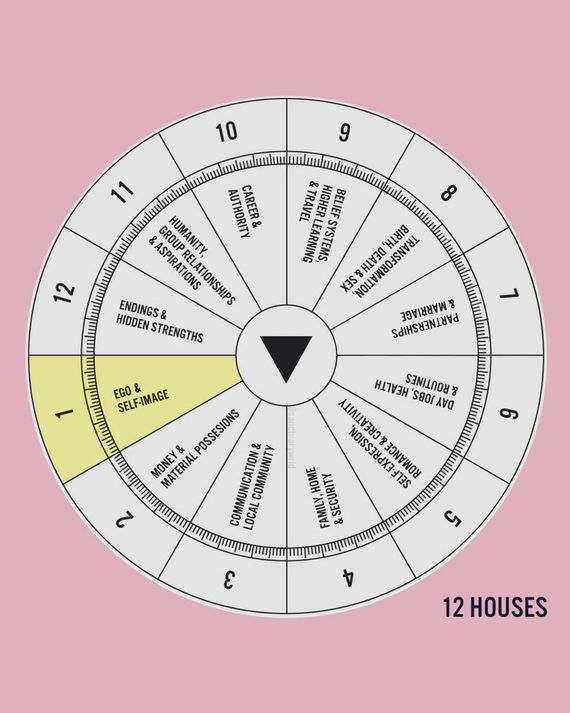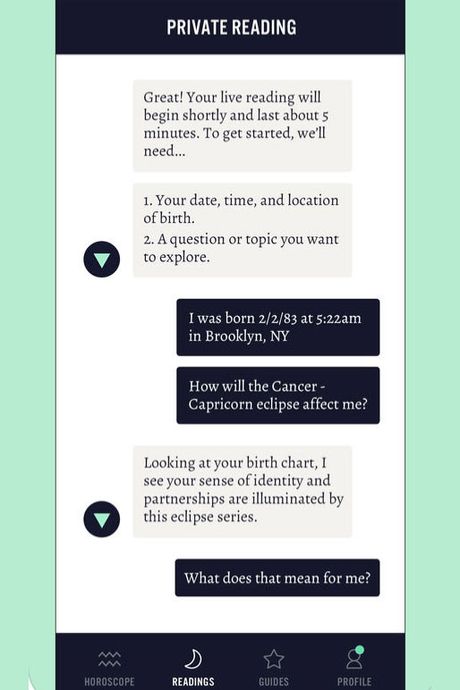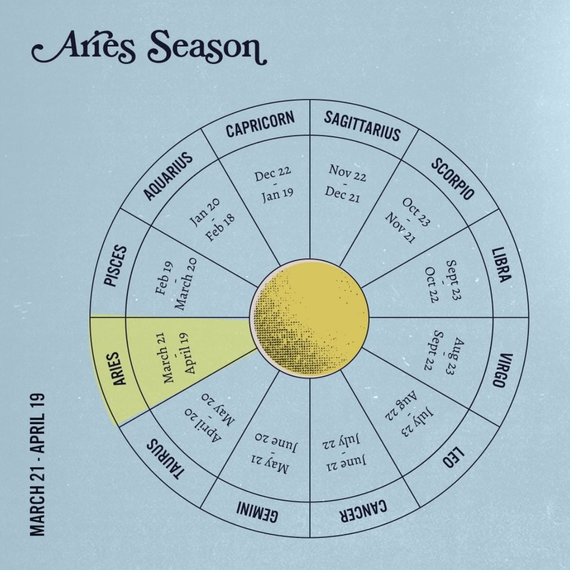
On February 21, my power emoji was a penguin. Ross Clark, the co-founder and CEO of the new astrology start-up Sanctuary had just entered the details of my birth date into its tidy little app and right away he let me know that I share a birthday with Britney Spears.
“Britney Spears!” Clark said with delight, “such a classic Sag!” Of course this made me wonder if I, too, am a “classic Sag,” and then I remembered a conversation I’d heard about from a 6-year-old’s birthday party not too long ago.
Mother A: “When is Emma’s birthday again?”
Mother B: “December 15,”
Mother A: “Mm-hm. I thought so. She’s got those classic Sag thighs.”
So I never got around to finding out what the power penguin was trying to say.
Sanctuary launched March 20, which was not coincidentally the start of Aries season and the astrological new year, with $1.5 million in seed funding. It’s not an enormous amount, but they have big plans for what they consider this wildly under-monetized market. It’s not an absurd perspective, considering astrology slots in nicely between the exploding fields of chat-based meditation and therapy, an increasingly familiar mix of wellness, hustle culture, and the new New Age.
Fortunes have been made in this “space” already. Headspace, the guided-meditation app, has been downloaded more than 16 million times; the therapy app Talkspace has over a million users who text, video-, or audio-chat with their therapists. But astrology isn’t just riding those waves, it’s having its own boom-time moment, offering cosmic reassurance to un-moored seekers like a mystical, always-available life coach with a level of interest a lot of astrologers say they haven’t seen since the hey-baby-what’s-your-sign ’70s.
“The services aspect of this business is bigger than anyone realizes,” Clark says. “Mystical services are a $2.2 billion dollar market. At one point in pitching this idea, someone said to me, ‘but astrology is such a niche market.’ And I said, nearly 40 percent of American women read their horoscope at least once a month. That’s not a niche market. What other thing with that level of frequency would you describe as niche?”
The business opportunity, of course, requires actual demand, arising from something like an actual need. Astrology can claim that. For the godless, or the spiritually unaffiliated, it offers assurance of larger forces; astrology can make you a part of something big, while sweetly taking destiny out of your hands — bigger forces are at work, and those forces are benevolent, which can be of comfort to someone living a secular life. And of course astrology places you at the center of your very own universe, with the promise that you are entirely unique, like a fingerprint or even (God forbid) a snowflake. In astrology, difficulty is just part of a predestined plan. If the end of your 20s is hard, well that makes sense because that’s when your Saturn returns. If it’s a particularly bad day, well, it’s Mercury retrograde again, pull up the covers and let it pass.
And anyway: the oceans are rising, the fires are coming, all our normal systems feel terribly, horribly out of whack. Why not look for answers in the sky? As Plato put it, “Astronomy compels the soul to look upwards and leads us from this world to another.”
In a demographic desperate for reassurance, a customized cosmos is a very valuable proposition. Goop recently ran a piece by a psychological astrologer named Jennifer Freed that offered many sweeping, general pieces of advice, including: “When we talk about self-acceptance, we are usually talking about making peace with our flaws.” The website wellandgood.com ran a chat with three of their astrology-obsessed editors, in which one concludes: “It’s nice to feel connected to something ancient and based in nature when we’re chained to our phones and computers all day.” “Yeah,” responds her colleague. “It feels nice and shame-free.”
But the new age of millennial astrology isn’t entirely earnest, either. Take astrology memes: like the one of Reese Witherspoon throwing an ice cream with the caption “Aquarius,” or the photo of a grinning Kermit the Frog captioned: “I hate it when people justify their shitty behavior with their zodiac sign. Like, ‘sorry I can’t help it I’m a Scorpio.’ No, Susan, you’re just a bitch.” Some dating apps, like Bumble, allow users to sort their results by sign (“Hell Yes!” was cosmopolitan.com’s reaction: “You can finally filter people by their zodiac signs on Bumble. It’s gonna be rough for Geminis.”).
Which all makes it hard to see the phenomenon as anything like an outburst of new religiosity — it’s more like playful, even quasi-ironic, self-cultivation “me time.” Clark’s own North Carolinian, church-going mother announced at Christmas that she had begun training to become an energy healer.
A high-school teacher I know thinks this is the natural result of a generation raised on Harry Potter and comforted by velvet and wizards and magic, but mostly it fits into the new whatever-gets-you-through-the-night spiritual paradigm of this particularly chaotic moment in time, a time when a lot of therapists charge one price for “therapy,” and another for solution-oriented “life-coaching” that focuses a lot less on introspection, or the process of identifying and breaking of patterns and habits and more on forward-thinking action.
The history of astrology begins thousands of years ago, in Babylonia, where early astrologers first studied the sky to predict the occurrence of seasons. The Babylonians brought their charts and ideas to the Greeks, around the 4th century B.C., where Plato and Aristotle got involved. It was the Romans who eventually named the signs of the Zodiac after the 12 lunar cycles it took for the sun to return to its original position.
Astrology was really just an early attempt to assign order, rhythm, and meaning to our chaotic and unpredictable work: an early form of scientific theory. But science advanced and rendered astrology obsolete: How do we know when the seasons are changing? Well, lots of ways now. In general we just know a whole lot more than the Babylonians, and the Greeks, and the Romans, about everything. One of the things we know for sure is that there is absolutely no empirical evidence that anything posited by the entire discipline of astrology is, in any hard-scientific sense, real. Which is an altogether different thing than saying it is not relevant.
Astrology, of course, has carried on, in spite of its classification as a “pseudo-science,” and its reputation as the domain of mystics and kooks. Its position as a part of popular Western culture began in 1930 when an astrologer named R.H. Naylor was hired by Britain’s Sunday Express newspaper to make astrological predictions on the birth of Princess Margaret. (The story goes that Naylor was not the first choice, he was merely the assistant to a high society neo-Shaman named Cheiro who had read the palms of both Grover Cleveland and Winston Churchill.) Naylor developed a following, not least because a prediction he made circa 1930, that a British aircraft would face trouble between October 8–15, and a British plane crashed north of Paris on October 5. It wasn’t exactly right, but it was close enough for people to get excited. Naylor’s new popularity led to the paper publishing a regular column of predictions and advice connected to sun signs, beginning in 1937. Because astrological charts can be complex, Naylor made the decision to focus on sun signs, which refer to the placement of the sun on the date of your birth — it’s the easiest to figure out, and the broadest: all you need is that date of your birth. Although hard core astrologers need the location and exact time of your birth in order to determine your moon sign (the moon takes a little more than two days to move through a zodiac sign, which is why astrologers ask for the time of your birth) and the location so they can tell you which sign was rising on the Eastern horizon as you came forth to meet the world. Each of these aspects is said to represent an aspect of a person: the sun sign as the dominant traits, the moon as the more personal, and rising as the way others see you. But that’s all a lot of fairly tricky work to figure out! So sun sign horoscopes are what became common, appearing in most daily papers and monthly magazines, and remain how most people identify. (Clark will tell you, however, to always check your moon and your rising if your horoscope doesn’t feel quite right one day, which increases your odds of feeling a connection.)
Popular astrologers today include Sally Brompton, whose daily koans in the New York Post have a loyal cult following, and Susan Miller, whose long, meandering monthly horoscopes on the lo-fi astrologyzone.com get 20 million page views a month. Miller’s horoscopes are so closely followed that when she posted a week late in the summer of 2014, a Facebook group called “Abandoned by Susan Miller” appeared and immediately got thousands of followers (it disbanded when Miller appeared with her typical 45,000 word posts, and apologized for having fallen ill.) Madame Clairevoyant is consistently one of the Cut’s best-read columns, and the Galactic Rabbit was so popular on thehairpin.com that she decided to spin out on her own. A typical post: “on my first date with my new therapist, she asked me about ‘the important pieces of the pie,’ family, relationships, career, health, and then the radial influences, leisure, pets, hobbies, etc. She didn’t ask me about the world, the large pie I stand on balancing my smaller pie, and I didn’t tell her. I’m telling you now, reader, and it’s not because the stars told me to or because the masks capitalism wears are falling off one by one into a polluted sea … although they are.”
“If you look at the millennial, Gen Z audience, sun sign identity is just huge,” Ross says. “Identity and self-reflection and thinking about the different parts of yourself in a way that’s much more wellness-y or Myers-Briggs-y, so it’s interesting. I also think if you’re a young person and you aren’t interested in organized religion and you’re experiencing transitions, the world is insane right now so there’s so much political, economic, environmental turmoil, and then you have so much disruption by technology, so I think these ancient practices have a hold on us and generate an interest that is really compelling.”
But if the astrology of a century ago reflected some spiritualist skepticism about the hard science of the world as it is, the new kind is up to something just slightly different — a kind of “try anything once” approach to self-improvement. Perhaps more than once. There are plenty of astrology apps out there, offering daily nuggets of advice, quite a lot like what you find in a newspaper or magazine.
And horoscopes are obvious phone candy: Who wouldn’t want something anodyne to tap on waiting for the subway? Especially if it feels personal or optimistic.
On Sanctuary, everyone gets a free, short, sun sign horoscope — “The Pisces new moon may feel a bit loaded as it encourages you to reflect on the personal spaces in need of healing,” — for example, as well as a bunch of background information about other signs, transits, and astrology in general. “The moon is considered an inner planet and takes approximately 2.5 days to transit a sign,” for example, “The moon rules the zodiac sign of Cancer and dictates a big part of your daily astrology.” Sanctuary lightens its information with a lot of pop cultural references and GIFs: a GIF of the Gilmore Girls hugging is captioned “The moon symbolizes the concept of the mother, and its placement in your birth chart represents how you “mother” yourself through both material and nonmaterial comforts,” and Venus gets a gif of Kirsten Dunst smoking from Sofia Coppola’s Marie Antoinette. “Think of Venus as a Marie Antoinette figure: Venus wants to eat sweets, be fanned with palms, and bathed only in the finest beauty products.” And, throughout, a tone of empowerment, like you might get from a particularly go-getter therapy session. One Sanctuary horoscope I got advised: “Give yourself a free pass to say ‘nope’ today. You can’t make everyone happy all the time, so start advocating for your own needs!” I took the advice, and that was a great day.
What is different about Sanctuary is the next option: Sanctuary is currently the only astrology app that provides the option of engaging in a live consultation with an actual astrologer (not an algorithm or a bot) any time, night or day, every single day of the year, which is where Sanctuary stops being free, and where it bets it can make big money. It also represents a different theory about what people are into about phone astrology: not the casual, affirmative scroll on the subway but actual, in depth guidance.
All Sanctuary astrologers have been vetted by a team helmed by Sanctuary’s chief astrologer, Aliza Kelly. They are located across the U.S. and in Europe, and they are waiting for you to ask whether you should sign the contract, go on the date, confront your mother, or just prepare you for the day. I had a text reading with an astrologer named Kat, who began by telling me that being a Sagittarius sun with a Pisces moon and a Taurus rising makes me “adventurous, curious, and visionary in your motivations, as well as highly intuitive and compassionate in your core. Your Taurus rising lends a natural grace and beauty to your appearance and the way that you relate to others.” She also told me to “show yourself the same compassion and attention that you devote to other people,” and that “you are an asset to any group,” and a “super helpful person.” She let me know that I should stop putting other people’s needs ahead of my own, which in addition to echoing the advice I’d gotten from the app just a few days earlier, felt like a cheat — sort-of-like someone saying “I’m a perfectionist!” when asked to describe a flaw in a job interview. She let me know a good day to “set some new intentions around the ways you collaborate with others,” and then, like any good therapist, she let me know we were out of time.
Kelly has long black hair that she wears in a modified beehive. On the day we met she was wearing thick, cat-eye eyeliner, black tights ripped in a ladder, and a big cardigan sweater. She looks like a pretty, healthy, and sober Amy Winehouse. Kelly studied art history in college and worked in the art world for a while before she got the idea to launch a dating app based on astrological signs. The app was called Align, and it launched in 2015. She says now that it was too soon. “I just have such a vivid memory of the New York Times scale on election night in 2016,” she says, “It was at 99 percent Hillary Clinton and then it went all the way to the other side of scale and I just realized that what we relied on to be valid was not actually accurate. It allowed people to become more receptive to the fact that everything isn’t black and white and there is a lot of nuance and a lot of gray areas and that’s where a lot of stuff happens. After 2016, the faucet just turned on. Suddenly, everybody everywhere was just fascinated by astrology.”
Kelly is a deep believer in the science and mathematics of her trade, but she also enjoys the pop-culture bits. She published a book about cocktails called The Mixology of Astrology, and made predictions about Pete Davidson and Ariana Grande for BuzzFeed (“What is more big dick energy than a Scorpio?”)
But she also takes her work as an astrologer seriously. She sees its therapeutic possibilities, and acknowledges that however much science is at work, there is an art to a reading, and that personal intuition has a lot to do with it. I ask her if she sees her work as therapeutic, and she said absolutely, not least because it’s worked that way in her own life. “There are certain things that I discovered about myself through the vocabulary of astrology,” she says, “that I had not been able to access through therapy, conversations with my family. It just really helped me make sense of things that otherwise there wasn’t really a language for. It suddenly made sense why people see me a certain way, but I feel oh-so-differently. It explains some of the baggage that I carry around my family’s heritage which was really profound.”
“I see mothers and daughters,” Clark says, “sort of like SoulCycle.” (He’s an avid SoulCycler himself). He sees them marching forth into their days with full confidence of their alignment in the universe, and purpose for the tasks that lie ahead. As for expansion, he imagines an organized and well-designed marketplace for crystals, geodes, and smudge sticks, something that could be beautiful and capitalist and spiritual and magical all at the very same time, a more organized Etsy, which does brisk business in zodiac necklaces, T-shirts (“Blame Mercury!”), and customized birth charts.
“A lot of people think this is Miss Cleo, and your dead Aunt is going to come through, but really, it’s just emotional. It’s about providing people with hope, or a positive mantra for their day.” Clark of course consults his stars regularly about the launch of Sanctuary and feels that what he’s learned about himself — mostly that he’s just a very ambitious person — is auspicious. And anyway, he’s checked the stars. “I truly believe,” he says, “that this is the perfect time to be doing this.”







